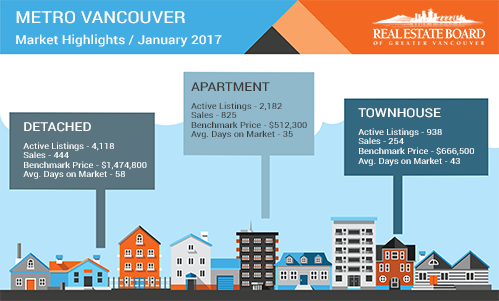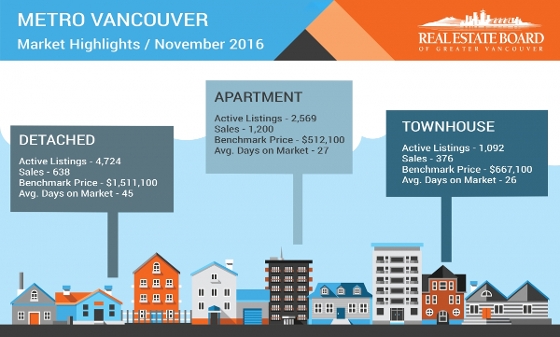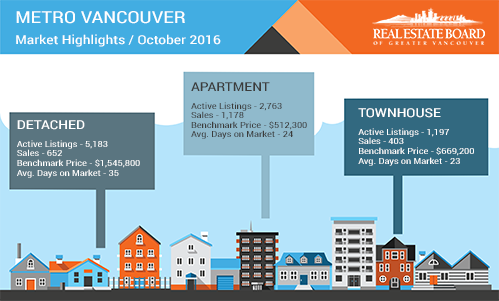Open House. Open House on Sunday, February 12, 2017 2:00PM - 4:00PM Don't miss this like new suite!



Residential property sales in the region totalled 1,523 in January 2017, a 39.5 per cent decrease from the 2,519 sales recorded in January 2016 and an 11.1 per cent decrease compared to December 2016 when 1,714 homes sold.
Last month’s sales were 10.3 per cent below our 10-year January sales average.
“From a real estate perspective, it’s a lukewarm start to the year compared to 2016,” Dan Morrison, Real Estate Board of Greater Vancouver (REBGV) president said. “While we saw near record-breaking sales at this time last year, home buyers and sellers are more reluctant to engage so far in 2017.”
New listings for detached, attached and apartment properties in Metro Vancouver totalled 4,140 in January 2017. This represents a 6.8 per cent decrease compared to the 4,442 homes listed in January 2016 and a 215.5 per cent increase compared to December 2016 when 1,312 properties were listed.
The total number of homes currently listed for sale on the Multiple Listing Service® (MLS®) in Metro Vancouver is 7,238, a 9.1 per cent increase compared to January 2016 (6,635) and a 14.1 per cent increase compared to December 2016 (6,345).
The sales-to-active listings ratio for January 2017 is 21 per cent. This is the lowest the ratio has been in the region since January 2015. Generally, analysts say that downward pressure on home prices occurs when the ratio dips below the 12 per cent mark for a sustained period, while home prices often experience upward pressure when it surpasses 20 per cent over several months.
“Conditions within the market vary depending on property type. The townhome and condominium markets are more active than the detached market at the moment,” Morrison said. “As a result, detached home prices declined about 7 per cent since peaking in July while townhome and condominium prices held steady over this period.”
The MLS® Home Price Index composite benchmark price for all residential properties in Metro Vancouver is currently $896,000. This represents a 3.7 per cent decline over the past six months and a 0.2 per cent decrease compared to December 2016.
Sales of detached properties in January 2017 reached 444, a decrease of 57.6 per cent from the 1,047 detached sales recorded in January 2016. The benchmark price for detached properties is $1,474,800. This represents a 6.6 per cent decline over the last six months and a 0.6 per cent decrease compared to December 2016.
Sales of apartment properties reached 825 in January 2017, a decrease of 24.7 per cent compared to the 1,096 sales in January 2016.The benchmark price of an apartment property is $512,300. This represents a 0.3 per cent increase over the last six months and a 0.4 per cent increase compared to December 2016.
Attached property sales in January 2017 totalled 254, a decrease of 32.4 per cent compared to the 376 sales in January 2016. The benchmark price of an attached unit is $666,500. This represents a 0.4 per cent decline over the last six months and a 0.7 per cent increase compared to December 2016.
SOURCE: Real Estate Board of Greater Vancouver
|
Down Payment Government Assistance -
On Dec 15, 2016 the BC Government announced the launch of their ‘Homeowner Mortgage and Equity Partnership Program’ to assist first time home buyers who are residents of BC (as well as either citizens or permanent residents of Canada for at least five years).While many are heralding this as a good news story, others suggest it a bad news story. The common theme on both sides is that thus far all the information around how this program will be applied by lenders is not in. And the information we do have suggests this is more of a neutral news story at least when it comes to purchasing power.
What many are unaware of, other than perhaps your Mortgage Broker, is that (some) lenders already offer down payment loan programs. These programs, called ‘flex-down’, are already approved by the mortgage insurance companies (Canada Guaranty, CMHC, & Genworth). And so for Canadian residents outside of BC hoping that such a program might be offered in their own provinces or territories the good news is that something quite similar already exists.
What the BC government is aiming for is a reduced cost version of the current flex down program, creating more of a hybrid product. Exactly how lenders embrace the BC government proposal remains to be seen at the time of this writing. Please contact me directly for further updates as this story develops.
What We Currently Know
Such programs are well intentioned, designed to help prospective homebuyers enter the market just a little bit earlier. And home ownership has proven a good thing not only for the economy but moreover for the social fabric of communities as well. However the BC Gov’t program offers no ‘new’ money to homebuyers.
The additional 5% (maximum) financing being offered is not a cash gift, it is a loan (a second mortgage).
Purchasing Power (unchanged) Any way it is sliced the borrower is operating within the same ‘maximum mortgage’ limit.
Option 1 - Borrow $1.00 from the mortgage lender or Option 2 – Borrow 0.95 cents from the mortgage lender and 0.05 cents from the BC Gov’t
Buyers are limited under federal lending guidelines to the same maximum total debt ($1.00 in the above example) as they were prior to this program.The BC Program replaces (it does not supplement) a portion of the debt side of the equation. It gives an applicant a different debt structure, not more debt, nor does it give buyers more cash in hand or equity in the property.
This is a loan – due and payable over 25yrs
Neither flex down mortgages, nor the BC program, gives buyers any greater purchasing power than they had previous to Dec 14th, 2016.
Qualifications It is also worth noting that there are significant qualification hurdles to clear for such an approval. Standards of qualification that were set higher in October of 2016 by the Federal government still must be met. Those changes reduced the purchasing power of this same group (sub 20% down buyers) as the BC program aims to assist. However the fact remains that the 20% reduction in purchasing power implemented by the Federal Government on this group of buyers remains in effect, the BC program does not offset those changes.
If nothing else, the announcement had a positive impact on the somewhat battered B.C. Real Estate buyers psyche, because it feels like a good news story. And certainly it has generated conversations between clients, Brokers, and Realtors. Communication is always a good thing. If you have any questions about your own down payment options, I’m here to help! |
|

The Metro Vancouver* housing market had its third highest selling year on record in 2016, behind only 2015 and 2005.
Sales of detached, attached and apartment properties in the region reached 39,943 in 2016, a 5.6 per cent decrease from the 42,326 sales recorded in 2015, and a 20.6 per cent increase over the 33,116 residential sales in 2014.
“It was an eventful year for real estate in Metro Vancouver. Escalating prices caused by low supply and strong home buyer demand brought more attention to the market than ever before,” Dan Morrison, Real Estate Board of Greater Vancouver (REBGV) president said.
“As prices rose in the first half of the year, public debate waged about what was fuelling demand and what should be done to stop it. This led to multiple government interventions into the market. The long-term effects of these actions won’t be fully understood for some time.”
Residential properties listed for sale on the Multiple Listing Service® (MLS®) in Metro Vancouver reached 57,596 in 2016. This is an increase of 0.6 per cent compared to the 57,249 properties listed in 2015 and a 2.6 per cent increase compared to the 56,066 properties listed in 2014.
“The supply of homes for sale couldn't keep up with home buyer demand for much of 2016. This allowed home sellers to raise their asking price. It wasn’t until the last half of the year that prices began to show modest declines.”
The MLS® Home Price Index (HPI) composite benchmark price for all residential properties in Metro Vancouver ends the year at $897,600. This represents a 2.2 per cent decrease over the past six months and a 17.8 per cent increase compared to December 2015.
Residential property sales in the region totalled 1,714 in December 2016, a decrease of 39.4 per cent from the 2,827 sales recorded in December 2015 and a decrease of 22.6 per cent compared to November 2016 when 2,214 homes sold.
Last month’s sales were 8.1 per cent below the 10-year sales average for the month.
New listings for detached, attached and apartment properties in Metro Vancouver totalled 1,312 in December 2016. This represents a decrease of 35.1 per cent compared to the 2,021 units listed in December 2015 and a 58.3 per cent decrease compared to November 2016 when 3,147 properties were listed.
The total number of properties currently listed for sale on the MLS® in Metro Vancouver is 6,345, a 5.3 per cent increase compared to December 2015 (6,024) and a 24.3 per cent decrease compared to November 2016 (8,385).
Sales of detached properties in December 2016 reached 541, a decrease of 52.4 per cent from the 1,136 detached sales recorded in December 2015. The benchmark price for detached properties is $1,483,500. This represents an 18.6 per cent increase compared to December 2015 and a 1.8 per cent decrease compared to November 2016.
Sales of apartment properties reached 915 in December 2016, a decrease of 25.3 per cent compared to the 1,225 sales in December 2015.The benchmark price of an apartment property is $510,300. This represents a 17.3 per cent increase compared to December 2015 and a 0.3 per cent decrease compared to November 2016.
Attached property sales in December 2016 totalled 258, a decrease of 44.6 per cent compared to the 466 sales in
December 2015. The benchmark price of an attached unit is $661,800. This represents a 20.4 per cent increase compared to December 2015 and a 0.8 per cent decrease compared to November 2016.

Residential home sales in the region totalled 2,214 in November 2016, a decrease of 0.9 per cent from the 2,233 sales recorded in October 2016 and a decrease of 37.2 per cent compared to November 2015 when 3,524 homes sold.
Last month’s sales were 7.6 per cent below the 10-year sales average for the month.
“While 2016 has been anything but a normal year for the Metro Vancouver housing market, supply and demand totals have returned to more historically normal levels over the last few months,” said Dan Morrison, Real Estate Board of Greater Vancouver (REBGV) president.
New listings for detached, attached and apartment properties in Metro Vancouver totalled 3,147 in November 2016. This represents a decrease of 20.9 per cent compared to the 3,981 units listed in October 2016 and a 7.2 per cent decrease compared to November 2015 when 3,392 properties were listed.
Last month’s new listing count was 1.2 per cent below the region’s 10-year new listing average for the month.
The total number of properties currently listed for sale on the MLS® system in Metro Vancouver is 8,385, an 8.3 per cent decrease compared to October 2016 (9,143) and a 3.6 per cent increase compared to November 2015 (8,096).
The sales-to-active listings ratio for November 2016 is 26.4 per cent. This is up two per cent from last month (24.4 per cent).
Downward pressure on home prices can occur when the ratio dips below the 12 per cent mark for a sustained period, while home prices can experience upward pressure when it surpasses 20 per cent over several months.
“Demand, relative to supply, for detached homes is lower right now than demand for townhomes and apartments,” Morrison said. “This is causing prices to remain stable, or flat, for townhomes and apartments, while detached homes are seeing modest month-over-month declines.”
The MLS® Home Price Index composite benchmark price for all residential properties in Metro Vancouver is currently $908,300. This represents a 1.2 per cent decrease compared to last month and a 20.5 per cent increase compared to November 2015.
Sales of detached properties in November 2016 reached 638, a decrease of 2.1 per cent from the 652 detached sales recorded in October 2016 and a 52.2 per cent decline over November 2015. The benchmark price for detached properties is $1,511,100. This represents a 2.2 per cent decline compared to last month and a 23 per cent increase compared to November 2015.
Sales of apartment properties reached 1,200 in November 2016, an increase of 1.9 per cent compared to the 1,178 sales in October 2016 and a 22.7 per cent decrease compared to November 2015.The benchmark price of an apartment property is $512,100. This is unchanged from last month and is an 18 per cent increase compared to November 2015.
Attached property sales in November 2016 totalled 376, a decrease of 6.7 per cent compared to the 403 sales in October 2016 and a 40.9 per cent decline compared to November 2015. The benchmark price of an attached unit is $667,100. This represents a 0.3 per cent decrease compared to last month and a 23 per cent increase compared to November 2015.
Source: REBGV (Real Estate Board of Greater Vancouver)

Premier Christy Clark unveiled a new loan program today to help first-time home buyers come up with their down payment.
The BC Home Owner Mortgage and Equity (HOME) Partnership program will offer qualifying home buyers loans of up to $37,500, interest and payment free, for five years.
The province will begin accepting applications on January 16, 2017.
To qualify, buyers must:
• be buying their first home;
• obtain a high-ratio, insured first mortgage for at least 80 per cent of the purchase price;
• have a combined gross household income not exceeding $150,000;
• have saved a down payment amount at least equal to the loan amount;
• be a Canadian citizen or permanent resident for at least five years; and
• have lived in BC for at least the full year preceding their application.
The loans will be due in full if the buyer defaults on a payment, ceases to use the home as a principle residence or resells the home.
Key facts:
• The loans will match a home buyer’s contribution to a down payment up to five per cent of the home’s purchase price.
• The maximum purchase price to qualify for a loan is $750,000 (excluding taxes and fees).
• After five years, buyers can either repay their loan or enter into monthly payments at current interest rates.
• Loans through the program are due after 25 years.
“This program will boost sales to first-time home buyers. Without question, they’ll take advantage of it wherever they can,” said Helmut Pastrick, Central 1 Credit Union chief economist.
The province estimates this initiative will help at least 42,000 buyers or households province-wide over the next three years. About half of these buyers will be in the Lower Mainland, according to Pastrick.


